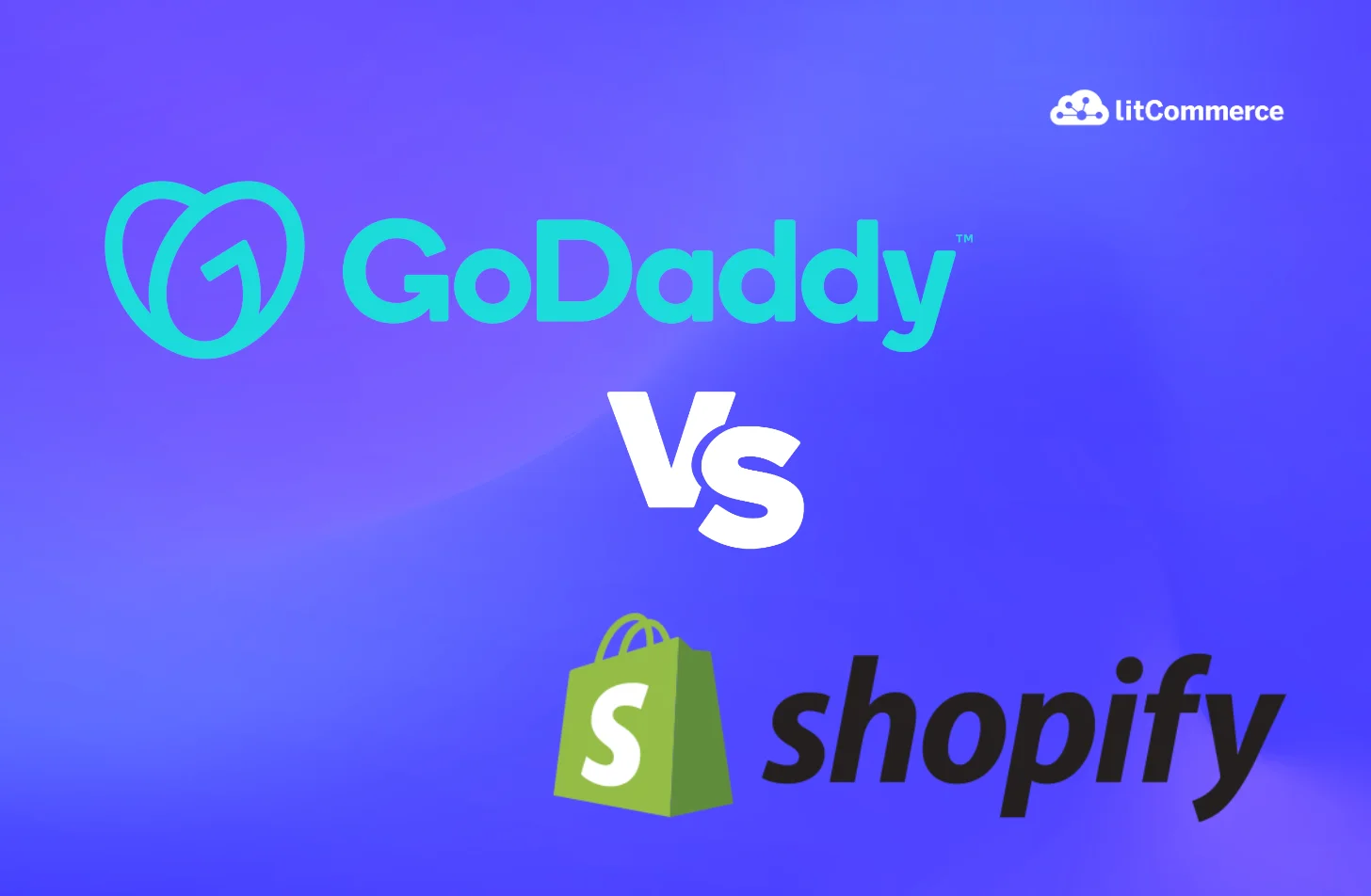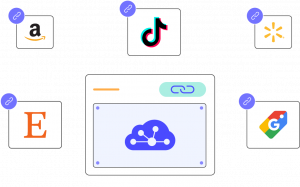Before comparing GoDaddy vs Shopify, let’s glance at these platforms.
GoDaddy and Shopify are two famous eCommerce platforms. Each of them targets different audiences and has feature sets.
GoDaddy is a domain registration service that provides web hosting and website-building tools. Its services range from various GoDaddy domain registrations, hosting, and e-mail to basic e-commerce. It appeals to users who want an all-in-one solution for managing their online presence, mainly people focused on swiftly placing a website online.
Shopify, on the other hand, is a specialized e-commerce platform designed specifically for building online stores. It offers advanced features such as inventory management, payment processing, and customizable storefronts. This platform is particularly favored by businesses focused on selling products online.
Sell on Both GoDaddy and Shopify! Why Not?
To maximize your profits and reach a wider audience, why not sell on both GoDaddy and Shopify? Using these platforms together can complement your business strategy and open up new opportunities.
Pricing and Value
Regarding GoDaddy vs Shopify, pricing concerns every small business owner. Both the vendors offer tiered pricing, including:
Shopify pricing
Shopify offers the following three major pricing tiers available:
- Basic Shopify ($25/month): Ideal for small businesses or startups, it includes features like an online store with unlimited products, 24/7 support, sales channels, and basic reports.
- Shopify Plan ($65/month): Suitable for growing businesses, it adds professional reports, more in-depth analytics, and better shipping discounts.
- Advanced Shopify ($399/month): Best for larger businesses, it offers advanced report building, third-party calculated shipping rates, and lower transaction fees.
- Shopify plus ($2300/month): Serves as an enterprise solution, which has custom pricing for high-volume businesses.
Shopify also has a Lite Plan, which is $9 per month for adding a “Buy” button to an existing site.
You can learn more details about Shopify pricing here: How Much Is Shopify: A Deep Dive into Latest Plans, Fees & More
GoDaddy pricing
GoDaddy’s pricing plans are more budget-friendly:
- Basic Plan ($11.99/month): Provides a simple website builder, SSL certification, and 24/7 support, ideal for small personal sites or informational business pages.
- Premium Plan ($21.99/month): Adds tools for online appointments and improved marketing features, targeted at service-based businesses.
- E-commerce Plan ($29.99/month): Designed for online stores, it includes basic eCommerce tools, PayPal integration, and product management capabilities.
GoDaddy’s plans are significantly more affordable, especially for small businesses with tight budgets or those looking to quickly establish an online presence.
Verdict: GoDaddy wins for pricing
GoDaddy offers a lower starting price, and its plans are generally more budget-friendly for smaller operations. So, GoDaddy an even better option is if your main concern happens to be the budget.
Ease of Use
Both GoDaddy and Shopify are known for their user-friendly interfaces, but they differ in terms of how easy they are to get started with, especially for beginners or users with limited technical skills.
Shopify setup and editor
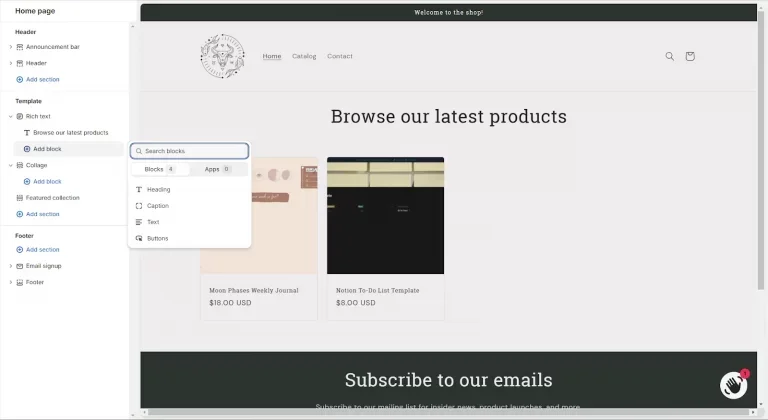
Shopify’s setup process uses an intuitive drag-and-drop editor, allowing users easily to customize their store’s layout.
While Shopify’s interface is user-friendly, it can feel overwhelming for beginners. This is due to the number of settings and options available, especially for those unfamiliar with eCommerce-specific features like managing product variants, taxes, and shipping rules.
GoDaddy setup and editor
Like Shopify, GoDaddy uses a drag-and-drop editor. GoDaddy’s editor is extremely simple and designed for beginners. It allows users to quickly modify pre-built templates without needing to understand coding or complex settings. The editor is minimalistic, so users can focus on adding content rather than configuring technical details.
Plus, GoDaddy guides users through a setup wizard that asks basic questions about the type of website they want to create (e.g., personal, business, online store). Once the type is chosen, GoDaddy automatically applies relevant templates, reducing the effort needed to start a site.
Verdict: GoDaddy wins for ease of use
Assessing the user experience of GoDaddy vs Shopify, GoDaddy is the clear winner for ease of use. Its highly simplified website builder and quick setup process are perfect for beginners or users who want to get a basic website online with minimal effort. Shopify, while still user-friendly, is more complex and better suited for users who need advanced eCommerce features and are willing to invest more time in setup.
E-Commerce Features
E-commerce functionality is one of the most important factors when choosing a platform for online selling. Shopify is designed with eCommerce at its core, whereas GoDaddy offers more basic features.

Shopify’s e-Commerce features
Shopify is a fully dedicated eCommerce platform, offering a wide range of advanced tools and features tailored for online stores, such as:
- Unlimited products: Users can add an unlimited number of products, including variants and SKUs. This is suitable for businesses of all sizes.
- Multiple payment gateways: Shopify supports over 100 payment gateways, including Shopify Payments, PayPal, Stripe, and more. It also supports multiple currencies, enabling businesses to sell internationally.
- Shipping and tax automation: Shopify provides built-in tools for automatic tax calculation and shipping rate generation. You can also integrate with major carriers like USPS, UPS, and DHL for real-time shipping rates.
- Advanced marketing tools: Shopify offers integrations with Google Shopping, Facebook, Instagram, and other platforms, making it easy to market products across different channels. The platform also supports email marketing, retargeting, and abandoned cart recovery.
- Shopify app store: Shopify’s app store includes thousands of third-party apps, allowing businesses to extend their store’s functionality. These apps cover everything from inventory management to advanced SEO, customer service, and analytics.
GoDaddy’s eCommerce features
GoDaddy offers more basic eCommerce functionality, suitable for small stores or businesses that are just getting started:
- Basic product management: GoDaddy supports product listings, but with fewer customization options compared to Shopify. It’s easy to add and manage products, but advanced inventory control and product variant features are limited.
- Payment gateways: GoDaddy integrates with popular payment gateways like PayPal and Stripe, but doesn’t offer the same extensive options as Shopify.
- Shipping options: GoDaddy provides simple flat-rate and free shipping options, which are sufficient for basic stores. However, it lacks advanced shipping automation and carrier integrations.
- Appointment scheduling: Unique to GoDaddy, this feature is ideal for service-based businesses. It allows customers to book appointments directly through the website, making it useful for businesses that offer services rather than physical products.
- Marketing tools: GoDaddy offers basic SEO tools and the ability to run email marketing campaigns. It also integrates with social media platforms for basic marketing purposes but lacks the advanced marketing automation available with Shopify.
Verdict: Shopify wins for e-Commerce features
Of course, Shopify is the clear winner in terms of eCommerce features. Its comprehensive tools for product management, payments, shipping, and marketing make it the best option for businesses looking to scale their online stores. GoDaddy’s eCommerce capabilities are more limited and suited for smaller stores with less complex needs.
Design Flexibility
A comparison of GoDaddy vs Shopify reveals significant differences in their design approaches.
Shopify’s design options

Shopify provides a selection of over 100 free and paid themes designed specifically for eCommerce. All themes are mobile-responsive and optimized for performance. This platform allows users to modify their templates using HTML and CSS, providing full control over the look and feel of their store. So, users can create unique designs or modify existing templates to fit their branding.
Furthermore, Shopify’s app marketplace includes design-focused apps allowing additional customization. Users can add features such as image sliders, and product galleries, or even integrate third-party design tools to further enhance the storefront.
GoDaddy’s design options
GoDaddy’s design capabilities are more straightforward and aimed at users who want to build a site quickly without diving too deep into customization.
GoDaddy offers a range of pre-built templates that are designed to be simple and easy to customize. Users can choose a template based on the type of site they are creating (e.g., business, personal blog, online store) and start modifying it with their content.
While GoDaddy allows users to change elements like colors, fonts, and images, it does not provide access to the underlying code (HTML/CSS) for more in-depth customization. This limits the degree of design flexibility compared to Shopify.
GoDaddy’s templates are also mobile-responsive, ensuring that sites built on the platform function well across devices. However, the mobile design customization options are more limited than Shopify’s.
Verdict: Shopify wins for design flexibility
In short, Shopify offers significantly more design flexibility compared to GoDaddy. Shopify’s extensive theme options, combined with the ability to modify code and integrate with third-party design apps. It is the best choice for users who want full control over their store’s appearance. GoDaddy’s simplified design tools are useful for beginners, but they lack the depth and customization capabilities required for creating a unique, professional-looking online store.
Payment and Transaction Options
When comparing GoDaddy vs Shopify, payment options and transaction fees are critical, as they can affect a business’s overall profitability. Both platforms support various payment gateways but differ in terms of flexibility and transaction fees.
Shopify’s payment options
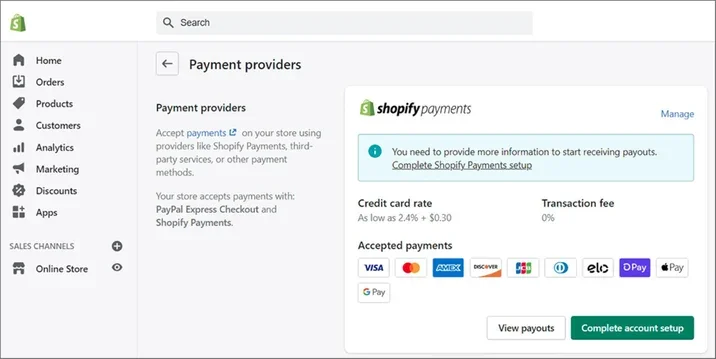
Shopify provides a robust selection of payment gateways to accommodate businesses globally. One of the standout features is Shopify Payments, which is Shopify’s built-in payment processing solution. It supports major credit cards and eliminates the need for third-party processors, streamlining the payment process. With Shopify Payments, businesses benefit from:
- No additional transaction fees beyond standard credit card processing fees (2.9% + 30¢ on the Basic plan).
- Faster payouts and seamless integration with the Shopify dashboard.
In addition to Shopify Payments, Shopify supports over 100 third-party payment gateways, including PayPal, Stripe, Amazon Pay, and Apple Pay. While third-party gateways offer flexibility for businesses with international customers, using them comes with additional transaction fees on top of credit card processing fees, ranging from 0.5% to 2% depending on the Shopify plan (rewrite for better: ‘2% for Basic Plan, 1% for Standard Plan, 0.5% for Advanced Plan),
GoDaddy’s payment options
GoDaddy’s payment options are more limited compared to Shopify, but they are still suitable for basic eCommerce needs. GoDaddy supports integration with PayPal and Square, two of the most popular payment processors for small businesses. These options allow businesses to accept credit cards, debit cards, and PayPal payments.
- Square: Primarily used for in-person payments, Square can also be integrated into GoDaddy’s online stores for online transactions.
- PayPal: With PayPal integration, GoDaddy merchants can accept payments directly through their store. However, it does not offer as many gateway options as Shopify.
GoDaddy does not charge additional transaction fees beyond the standard processing fees for these payment gateways. Thus, it is a straightforward solution for small businesses. However, the limited number of payment gateways may be restrictive for businesses selling internationally or needing advanced payment features.
Verdict: Shopify wins for payment options
Shopify’s flexibility with Shopify Payments and support for a wide range of third-party gateways makes it better suited for diverse business needs, particularly for those looking to scale internationally or offer various payment options. The absence of extra transaction fees when using Shopify Payments is a significant advantage over GoDaddy’s more limited options.
SEO and marketing tools
Shopify vs GoDaddy both offer features to help businesses increase their online visibility, but Shopify provides more advanced tools.
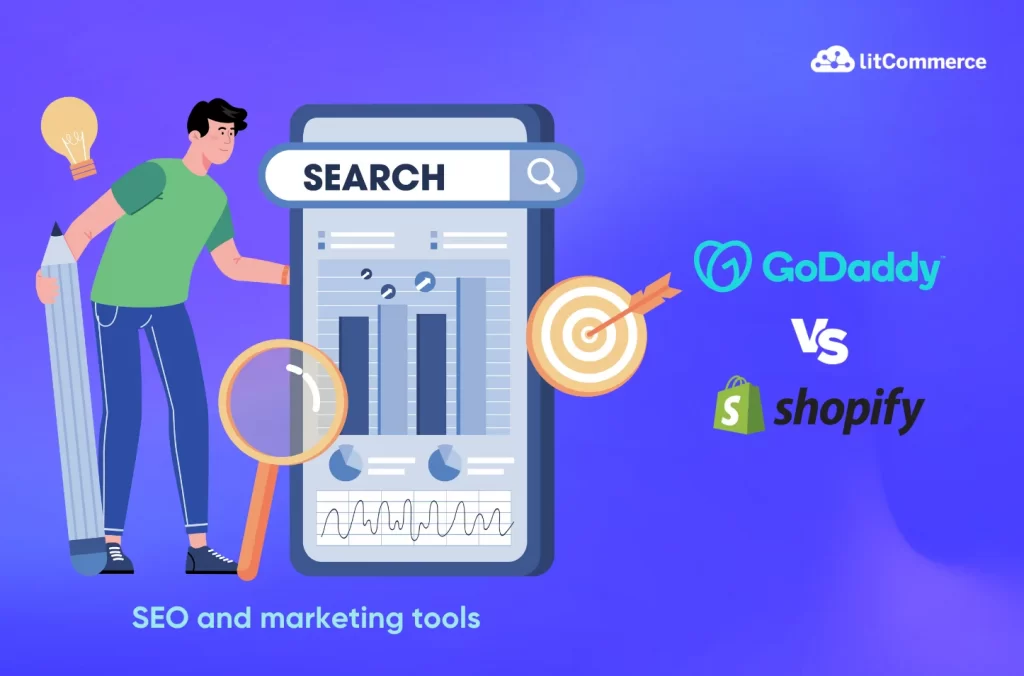
Shopify’s SEO and marketing features
Shopify has a number of inbuilt tools and apps that can help gain better visibility and increase engagement in the store. The main SEO features include editable meta tags, where the user can change the meta title and description for products, blogs, and pages for search engine ranking purposes. It also supports custom URLs, enabling the user to create SEO-friendly page links for better performance in search. The platform also has a fully integrated blogging feature, which acts as strong content marketing and enhances SEO.
Plus, Shopify offers an integrated suite of marketing tools to help businesses attract, engage, and retain customers. Shopify Email allows you to create and send branded emails directly from the admin, using customizable templates and automation for effective outreach. Additionally, Shopify Forms aid lead generation by capturing customer information. With Automations, you can set workflows for tasks like welcome emails and re-engagement.
Furthermore, Shopify Inbox manages chats for instant support, enhancing the shopping experience. For advertising, Shopify Audiences creates custom audience lists for targeted ads on Meta and Google, boosting conversions while lowering costs. Shop Campaigns enable risk-free advertising, paying only upon conversion. Finally, Shopify Collabs connects brands with influencers on Instagram, YouTube, and TikTok, driving sales and brand visibility through strategic partnerships.
GoDaddy’s SEO and marketing features
GoDaddy has a few features that surround marketing. Some of its key SEO tools include an SEO wizard, which steps users through keyword selection and content optimization to help improve site visibility. Users can edit meta titles and page descriptions, but it’s less powered compared to Shopify. While SEO guidance is given in terms of do’s and don’ts or best practices, the level of depth and flexibility falls far from the more robust SEO that Shopify offers.
On the marketing front, GoDaddy embeds basic email marketing tools directly into the website builder, allowing users to send campaigns to their contact lists. There is social media integration, connecting with platforms like Facebook and Instagram. One of the standout features in GoDaddy, however, is GoDaddy InSight: a tool that provides performance metrics and personalized recommendations to improve site visibility and marketing efforts.
Verdict: Shopify wins for SEO and marketing tools
Shopify provides more advanced and flexible SEO features. It also offers robust marketing options. So, it’s the better choice for businesses that want to focus on driving organic traffic and growing sales through strategic marketing.
Customization and Integrations
Customization and third-party integrations are key to scaling and adapting a website or online store to unique business needs. Let’s compare this aspect between GoDaddy vs Shopify.
Shopify customization and integrations
Shopify shines when it comes to customization and third-party integrations. The platform offers:
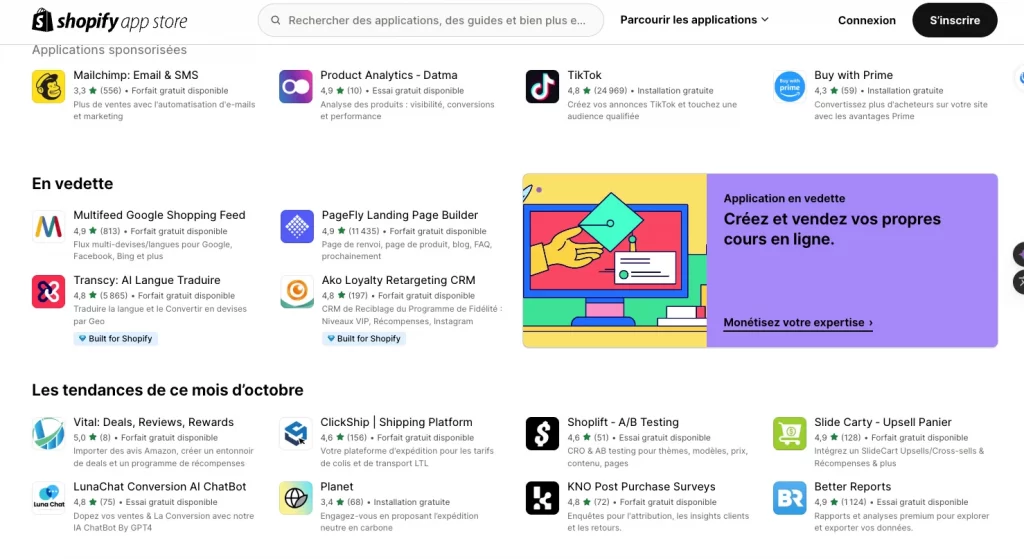
- Extensive app store: Shopify has an app marketplace with over 6,000 apps, covering a wide range of functionalities, including data import (like BulkFlow), SEO optimization, inventory management, customer support, and marketing. This allows users to easily extend the capabilities of their online store.
- Open API: Shopify’s open API allows developers to create custom apps and integrate external software into their Shopify stores, offering virtually limitless customization options.
- Custom themes: Shopify provides access to both free and premium themes, all of which can be customized with HTML and CSS. This flexibility allows businesses to create highly unique and professional-looking stores.
- Third-party integrations: Shopify supports integrations with numerous third-party services, such as Google Analytics, QuickBooks, and CRM tools, making it easy for businesses to streamline operations.
GoDaddy customization and integrations
GoDaddy offers fewer customization options and has a smaller app marketplace compared to Shopify. However, it still provides some useful features for basic integrations:
- Limited app marketplace: GoDaddy offers a small selection of integrations through its app marketplace, mostly focused on marketing and eCommerce, but it’s nowhere near as extensive as Shopify’s offering.
- Third-party services: GoDaddy integrates with key services like Google Analytics, PayPal, and social media platforms, but the overall flexibility for adding new functionality is more restricted.
- Custom themes: GoDaddy provides pre-designed templates with limited customization options. Users can modify layouts, colors, and fonts, but advanced theme customization (like editing HTML or CSS) is not available.
Verdict: Shopify wins for customization and integration
Shopify stands out with its vast app ecosystem, customizable themes, and open API. It becomes the better platform for businesses that require specific functionalities or tools. GoDaddy offers basic integrations and customizations, but it doesn’t match Shopify’s flexibility or range of options.
Customer support
Customer support is an important consideration, especially for businesses that may need quick assistance to keep their websites or stores running smoothly.
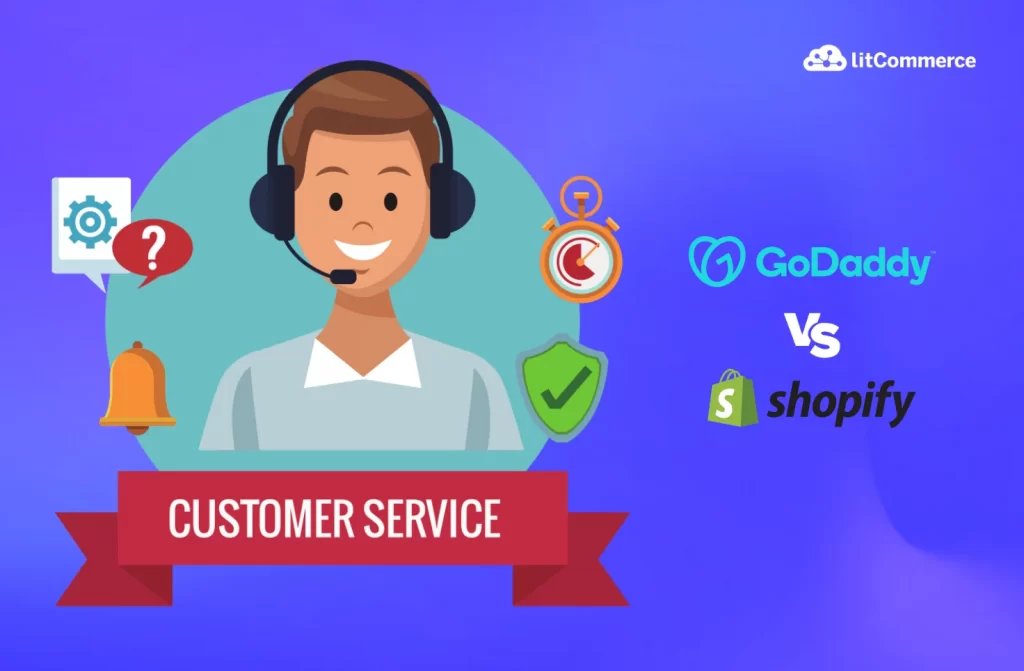
Shopify’s customer support
Shopify offers robust 24/7 support via live chat, phone, and email. This makes it easy for users to get help at any time, regardless of their location. Moreover, Shopify’s knowledge base includes articles, guides, and video tutorials on virtually every aspect of using the platform.
Shopify has also an active user community where users can ask questions, share solutions, and discuss platform updates. In particular, enterprise-level customers on Shopify Plus receive priority support, including a dedicated account manager and faster response times.
GoDaddy’s customer support
GoDaddy also has reliable customer support but with some limitations depending on the plans. It provides phone and live chat support, though availability varies based on the user’s plan. Premium support options are available for higher-tier plans.
Like Shopify, GoDaddy has a help center with articles, tutorials, and FAQs to help users solve common problems. GoDaddy also offers community forums, though they are less active than Shopify’s.
Users on certain plans can pay extra for premium customer support, which offers faster response times and priority access to help.
Verdict: Shopify wins for customer support
Shopify offers more reliable and comprehensive customer support, particularly for businesses that may need assistance around the clock. GoDaddy’s support is solid but can be limited depending on the plan and availability.
Final Verdict: Which is Better for You?
Both GoDaddy vs Shopify are highly capable platforms, but the right choice for your business depends on your specific needs, budget, and goals. Below is a summary of the key points discussed and final recommendations for which platform is best suited for different types of businesses.
Shopify for growing businesses
Shopify is the best platform for businesses focused on online retail and growth. Its comprehensive suite of eCommerce tools, payment gateway options, and customization capabilities make it ideal for:
- Online retailers: If selling products is your main business, Shopify is the superior platform with its advanced eCommerce features, from inventory management to shipping automation.
- Scaling businesses: Shopify’s robust infrastructure supports businesses that plan to grow, providing the flexibility to handle larger volumes of products, customers, and transactions.
- Customizable stores: For businesses that require a unique and highly customized online store, Shopify’s extensive app store, open API, and access to custom themes provide limitless possibilities.
- Global and diverse businesses: Shopify’s ability to handle multiple currencies, languages, and third-party payment gateways makes it ideal for businesses with international aspirations.
- Marketing and SEO-driven businesses: Shopify’s built-in SEO tools, abandoned cart recovery, and strong social media integrations help businesses drive more traffic and recover lost sales.
The trade-off for Shopify’s advanced features is a higher price point. It is better suited for businesses willing to invest more in their online store’s growth and performance.
GoDaddy for small, budget-conscious businesses
GoDaddy, on the other hand, is an excellent choice if you’re looking for a simple, affordable, and easy-to-use platform to create a basic website or a small eCommerce store. Its lower price point and streamlined setup process make it perfect for:
- Small businesses: If you’re a local business or a service provider looking to create an online presence quickly without needing advanced features, GoDaddy’s simplicity will appeal to you.
- Beginners: For individuals with little to no technical experience, GoDaddy’s intuitive drag-and-drop editor and quick setup make it easy to launch a website in minutes.
- Service-based businesses: GoDaddy’s built-in appointment scheduling tools are particularly useful for businesses offering services, such as salons, fitness trainers, or consultants.
- Budget-conscious users: If your primary concern is keeping costs low, GoDaddy offers more affordable pricing plans with essential features for website creation.
Start Your Multichannel Selling Business!
With LitCommerce, managing multiple sales channels has never been easier. Seamlessly integrate platforms like Shopify, GoDaddy, Amazon, eBay, and more into one centralized system. Automate inventory syncing, streamline product listings, and simplify order fulfillment—all while saving time and reducing errors.
GoDaddy vs Shopify – FAQs
GoDaddy is primarily a web hosting provider, whereas Shopify is a dedicated eCommerce platform. You can certainly host an online store on GoDaddy using various solutions, but you cannot host a Shopify store directly on GoDaddy. However, you can purchase or manage a GoDaddy domain and connect it to your Shopify store. Yes. GoDaddy provides an automatic domain connection feature for Shopify, letting you easily link a GoDaddy domain to a Shopify store without transferring your hosting to Shopify. Alternatively, you can choose to connect your GoDaddy domain to Shopify manually. Yes. You can migrate your existing site content by copying and pasting it into your new Shopify store. Additionally, you can export data from GoDaddy in CSV files and import it into Shopify, although certain data may not transfer seamlessly this way. To simplify the process, you can also use third-party migration apps from the Shopify App Store—such as LitExtension—to efficiently move your products, orders, and customer information.
Conclusion
In conclusion, choosing between GoDaddy and Shopify ultimately depends on your business needs, goals, and level of experience in eCommerce.
Regardless of the platform you choose, managing multiple sales channels effectively is key to growing your business. LitCommerce can help you. With LitCommerce, you can focus on building your brand and boosting sales while minimizing the complexity of multichannel management.
Now, it’s time to choose the platform that aligns with your goals and let LitCommerce take your eCommerce success to the next level!

